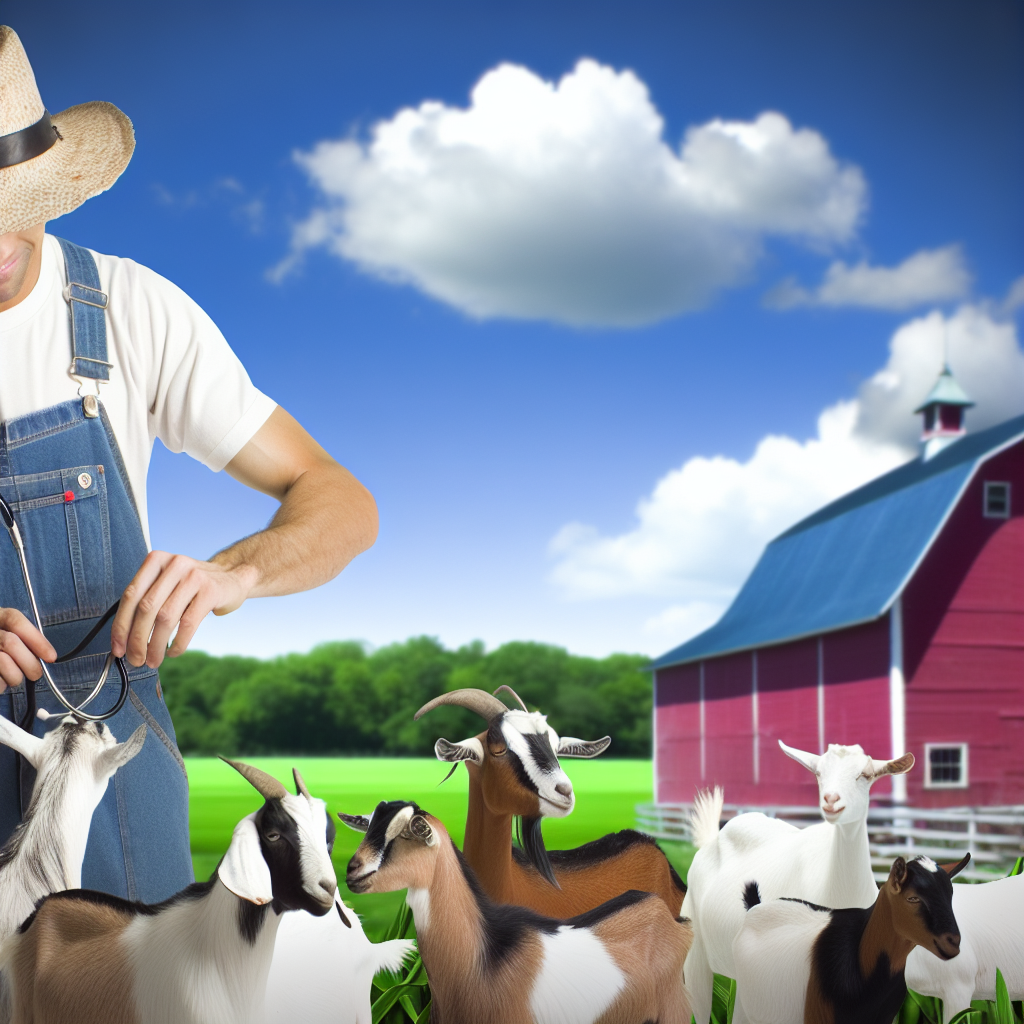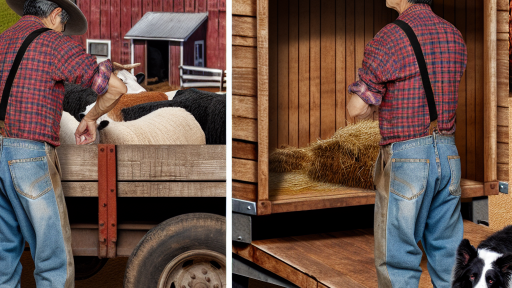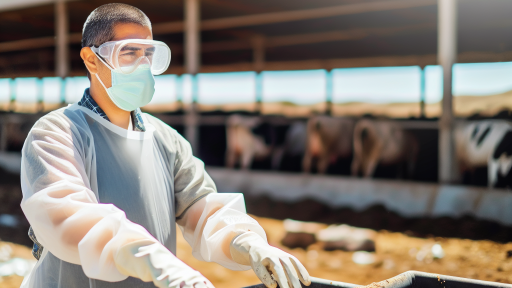Understanding Common Goat Diseases and Their Symptoms
Importance of Monitoring Goat Health
Monitoring goat health is crucial for successful farming.
A proactive approach helps in early disease detection.
This practice can minimize losses and improve productivity.
Common Goat Diseases
Several diseases frequently affect goats.
Understanding these conditions aids in effective management.
Caprine Arthritis Encephalitis (CAE)
CAE is a viral disease that affects young goats.
Symptoms include weakness and difficulty walking.
Additionally, infected goats may show swollen joints.
Johne’s Disease
Johne’s disease is caused by a bacterium called Mycobacterium avium.
Initially, infected goats may appear healthy.
However, symptoms include weight loss and diarrhea over time.
Pneumonia
Pneumonia is a common respiratory disease in goats.
Key signs include coughing, nasal discharge, and labored breathing.
Good ventilation can help reduce pneumonia risks.
Internal Parasites
Internal parasites negatively impact goat health.
Transform Your Agribusiness
Unlock your farm's potential with expert advice tailored to your needs. Get actionable steps that drive real results.
Get StartedSymptoms can include weight loss, anemia, and lethargy.
Regular deworming is essential for prevention.
Recognizing Symptoms Early
Early recognition of symptoms can be lifesaving.
Farmers should observe their goats daily.
Another key aspect is maintaining proper feeding practices.
Healthy goats exhibit good weight and energy levels.
Consulting Professionals
Farmers should not hesitate to consult veterinarians.
Veterinarians can offer valuable insights and treatment options.
Regular health check-ups ensure goats remain healthy.
The Importance of Vaccination and Preventative Care
Vaccination as a Key Component
Vaccination plays a vital role in goat health management.
It protects goats from various infectious diseases.
Farmers should establish a vaccination schedule early.
Common vaccines include those for CD&T and rabies.
Work with a veterinarian to tailor the vaccination plan.
Regular vaccinations help ensure herd immunity.
Understanding Disease Prevention
Preventative care goes hand-in-hand with vaccination.
Farmers must monitor for signs of illness consistently.
Implement biosecurity measures to limit disease spread.
Separating new or sick animals helps protect the herd.
Regular health checks and parasite control programs are essential.
Nutritional Support for Healthy Livestock
Nutrition significantly impacts goat health and immunity.
Provide a balanced diet that meets their specific needs.
Ensure they have access to fresh water at all times.
Learn which minerals and vitamins are critical for goats.
Showcase Your Farming Business
Publish your professional farming services profile on our blog for a one-time fee of $200 and reach a dedicated audience of farmers and agribusiness owners.
Publish Your ProfileConsider nutritional supplements based on field conditions.
Establishing an Effective Record-Keeping System
Maintain thorough records of vaccinations and health checks.
This system helps track which treatments worked best.
Document any signs of illness promptly for future reference.
A good record-keeping system simplifies management tasks.
Additionally, it assists in making informed decisions.
Nutritional Needs: Creating a Balanced Diet for Goats
Understanding Goat Nutritional Requirements
Goats have specific nutritional needs that farmers must meet.
A balanced diet ensures optimal health and productivity.
First, recognize their requirement for energy, protein, vitamins, and minerals.
With this understanding, you can formulate an effective diet.
Essential Components of Goat Feed
The primary ingredient in goat feed is forage, which can be hay, grass, or silage.
Include legume hay for higher protein content.
Grains can boost energy but use them sparingly to prevent digestive issues.
Mineral supplements are crucial for maintaining overall health.
Ensure goats have constant access to clean, fresh water.
Feeding Practices
Implement regular feeding schedules to promote digestive health.
Balance the diet based on the age, weight, and production goals of your goats.
Younger goats need more protein than adults to support growth.
Adult goats, however, might require higher fiber levels for digestion.
Observation and Adjustment
Regularly observe your goats’ body condition and overall health.
Adjust their diet as needed based on seasonal changes and lifestyle shifts.
Consult with a veterinarian for tailored nutritional advice.
Keep track of any changes in behavior or productivity, as these can indicate dietary issues.
Find Out More: Marketing Strategies for Selling Farmed Fish Successfully
Managing Parasites: Effective Deworming Strategies
Understanding Parasite Risks
Parasites pose significant health risks to goats.
They can cause weight loss and weakness.
In severe cases, parasites can lead to death.
Regular monitoring helps identify potential issues.
Choosing the Right Dewormers
Select dewormers based on the parasite type.
Common classes include benzimidazoles, avermectins, and pyrantel.
Consult with a veterinarian to determine the best options.
Rotate dewormers to prevent resistance buildup.
Establishing a Deworming Schedule
Develop a consistent deworming schedule for your herd.
Consider factors like age, season, and pasture conditions.
Adult goats may need deworming every six months.
Kids typically require deworming more frequently.
Administering Dewormers Effectively
Use the proper dosage based on body weight.
Ensure accurate measurements for effective treatment.
Administer dewormers orally for best absorption.
Observe goats after treatment for any adverse reactions.
Showcase Your Farming Business
Publish your professional farming services profile on our blog for a one-time fee of $200 and reach a dedicated audience of farmers and agribusiness owners.
Publish Your ProfileMonitoring and Evaluating Effectiveness
Post-treatment fecal egg counts help assess effectiveness.
Take samples about two weeks after deworming.
Record results to refine your deworming strategy.
Consider conducting regular health checks for overall well-being.
Preventive Management Practices
Implement rotational grazing to reduce parasite loads.
Keep pastures clean and minimize overcrowding.
Provide good nutrition to support the immune system.
Regular hoof trimming and health checks contribute to overall health.
Find Out More: Best Practices For Livestock Waste Management
The Role of Regular Health Check-Ups in Goat Farming
Importance of Regular Health Check-Ups
Regular health check-ups are essential in goat farming.
They help identify health issues early on.
This proactive approach can save time and resources.
Additionally, it ensures goats remain productive and healthy.
Scheduling Health Check-Ups
Farmers should establish a regular schedule for check-ups.
Consider doing this at least twice a year.
Moreover, adjust the schedule based on the goats’ needs.
Younger goats may require more frequent visits.
Signs that Indicate a Health Check-Up is Needed
Look out for unusual behavior in your goats.
Changes in eating habits can also signal health problems.
Other indicators include coughing, limping, or lethargy.
In such cases, seek veterinary assistance promptly.
Components of a Health Check-Up
A thorough health assessment includes several vital checks.
Start with physical examinations of each goat.
Check the eyes, ears, and mouth for any abnormalities.
Examine the skin for coat condition and signs of parasites.
Additionally, monitor the goats’ weight and body condition scores.
Record Keeping
Keeping detailed health records is crucial.
Document all findings from health check-ups.
This information helps track patterns over time.
Furthermore, it assists in making informed management decisions.
Working with Veterinarians
Collaborate closely with qualified veterinarians.
They can provide valuable insights into optimal health practices.
Regular consultations increase the effectiveness of health management.
Veterinarians can also advise on vaccination schedules and treatments.
Vaccination and Preventive Care
Implement a robust vaccination program for your herd.
Preventive care greatly reduces the likelihood of disease outbreaks.
Common vaccinations include those for clostridial diseases.
Additionally, consider vaccinations for other region-specific diseases.
Educating Farm Staff
Ensure that all farm staff are knowledgeable about goat health.
Provide training on recognizing health issues and providing care.
Showcase Your Farming Business
Publish your professional farming services profile on our blog for a one-time fee of $200 and reach a dedicated audience of farmers and agribusiness owners.
Publish Your ProfileThis creates a culture of health awareness on the farm.
Moreover, it empowers staff to act swiftly when problems arise.
Find Out More: Sustainable Fencing Solutions for Sheep

Breeding for Health: Selecting Disease-Resistant Stock
Understanding Disease Resistance
Disease resistance plays a key role in goat health management.
Selecting disease-resistant stock minimizes the risk of outbreaks.
Farmers should prioritize traits such as immunity and resilience.
Choosing Breeding Goats
First, evaluate the health history of potential breeding goats.
Look for goats with proven disease resistance in their lineage.
Consult with veterinarians about specific health traits to seek.
Evaluating Genetics
Genetic testing provides valuable insights into disease vulnerabilities.
Consider using DNA testing to identify resistant traits.
Thoroughly understand the genetic backgrounds of your goats.
Practicing Good Herd Management
Good herd management practices enhance overall health and resilience.
Regular health checks help identify disease exposure early.
Provide a balanced diet rich in vitamins and minerals.
Staying Informed about Diseases
Stay updated on prevalent diseases in your region.
Attend conferences and workshops about goat health management.
Network with other farmers to share experiences and strategies.
Explore Further: Weight Gain Techniques for Beef Cattle
Maintaining Cleanliness and Sanitation in Goat Housing
The Importance of Cleanliness
Cleanliness in goat housing is crucial for overall health.
It helps prevent diseases and promotes animal well-being.
Furthermore, clean environments can enhance milk production.
A clean space allows goats to exhibit natural behaviors comfortably.
Regular Cleaning Practices
Establish a routine cleaning schedule for goat housing.
Daily cleaning should include removing manure and wet bedding.
Additionally, ensure that feeding areas are kept tidy.
Weekly deep cleans are important for overall sanitation.
Use appropriate cleaning agents that are safe for goats.
Ventilation and Air Quality
Proper ventilation is essential in goat housing.
It helps reduce moisture and ammonia levels in the air.
Good air quality is vital for respiratory health in goats.
Ensure that windows and vents are unobstructed.
Regularly monitor air circulation to maintain freshness.
Pest Control Measures
Pests can pose serious threats to goat health.
Implement preventive measures to control pests effectively.
Consider using natural repellents to minimize chemical exposure.
Regular inspections can help identify potential infestations.
Keep the surrounding areas clean and free of debris.
Providing Clean Water
Access to clean water is vital for goat health.
Replace water daily to ensure freshness and cleanliness.
Showcase Your Farming Business
Publish your professional farming services profile on our blog for a one-time fee of $200 and reach a dedicated audience of farmers and agribusiness owners.
Publish Your ProfileMonitor water troughs for algae and contaminants regularly.
Clean water sources can prevent waterborne diseases.
Reviewing and Updating Sanitation Protocols
Regularly review your sanitation practices for effectiveness.
Stay updated on best practices for goat housing management.
Seek advice from veterinarians and livestock specialists.
Adjust protocols as needed based on seasonal changes.
Emergency First Aid Tips for Goat Farmers
Understanding Common Injuries
Goats are active animals, so injuries can occur often.
Common injuries include cuts, abrasions, and fractures.
Recognizing these injuries early is crucial for effective treatment.
Basic First Aid Supplies
Every goat farmer should have a well-stocked first aid kit.
This kit should include antiseptic, bandages, and wound dressings.
Add scissors, tweezers, and gloves to the list for efficiency.
Steps for Treating Cuts and Abrasions
Start by gently cleaning the wound with antiseptic solution.
Apply a sterile bandage to protect the area from infection.
Monitor the injury daily for signs of healing or infection.
Addressing Fractures
If you suspect a fracture, keep the goat calm and still.
Use a splint or bandage to immobilize the injured limb.
Contact a veterinarian as soon as possible for further assessment.
Dealing with Heat Stress
Heat stress is a serious condition in goats during hot weather.
Recognize signs such as excessive panting and lethargy.
Provide plenty of fresh water and shade to cool them down.
Handling Breathing Difficulties
Breathing difficulties may indicate serious health issues.
Check for signs of distress, such as labored breathing or coughing.
Isolate the affected goat and contact a veterinarian immediately.
Recognizing Signs of Illness
Be vigilant for changes in behavior or appetite.
Monitor for symptoms such as drooping ears or lethargy.
Early detection of illness leads to better outcomes.
Consulting a Veterinarian
Always develop a relationship with a trusted veterinarian.
They can provide guidance and support during emergencies.
Maintain an emergency contact number in your first aid kit.
Additional Resources
Biosecurity for Sheep and Goat Producers | Animal and Plant Health …




